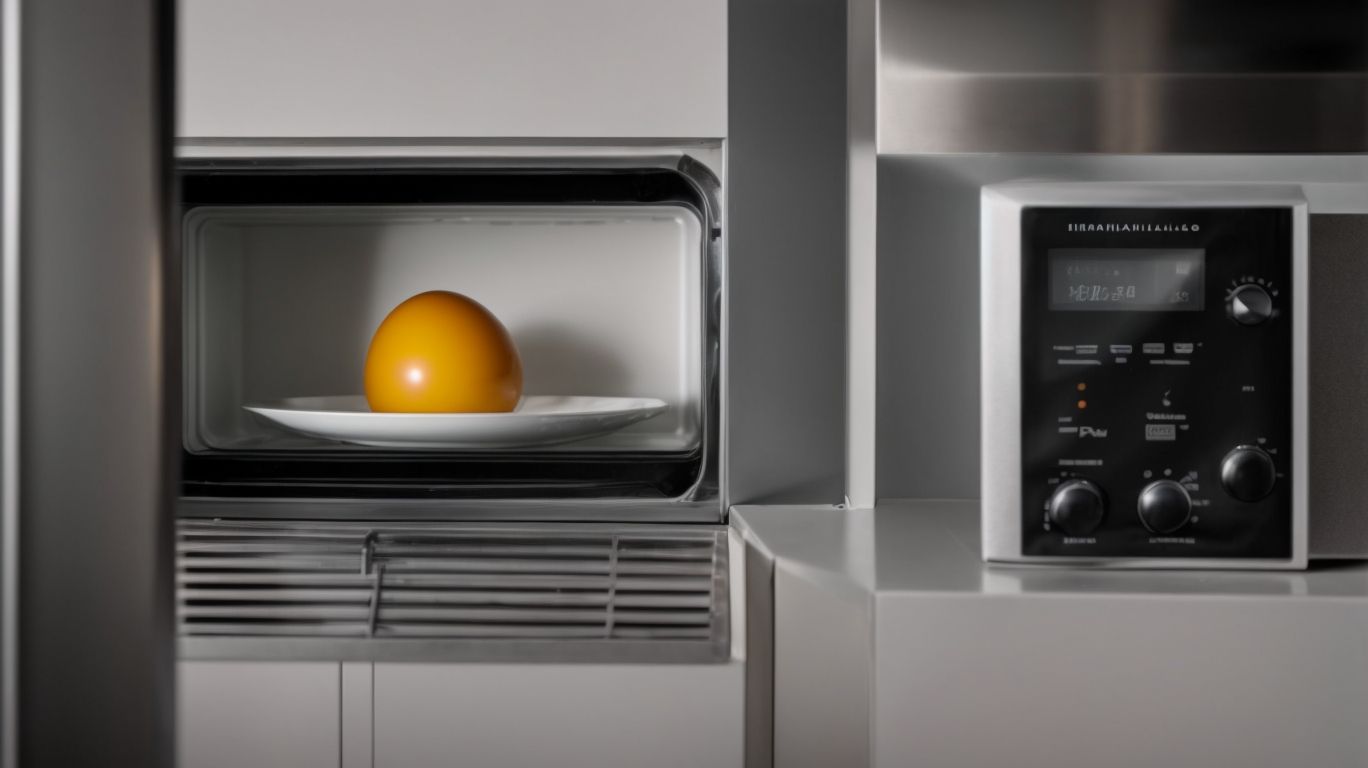How to Cook an Egg in the Microwave Without It Exploding?
Are you tired of your eggs exploding in the microwave? Look no further!
We will explore the science behind why eggs explode in the microwave and how you can cook them perfectly every time. From preparing the egg to choosing the right container and adjusting the microwave settings, we will provide you with step-by-step instructions.
Stay tuned for tips and tricks on preventing egg explosions and making a perfectly cooked microwave egg. Let’s get cracking!
Key Takeaways:
What Is Microwave Cooking?
Microwave cooking refers to the process of preparing and heating food using microwave ovens, a quick and convenient method for various dishes.
One of the key advantages of microwave cooking is its speed. Unlike traditional methods, which can take hours, a microwave can heat up food in minutes, making it ideal for those with busy schedules or limited time to cook. Microwave cooking is known for preserving the nutrients in food better than other methods, as the quick cooking time prevents excessive nutrient loss.
The versatility of microwave cooking is another major perk. Not only can you reheat leftovers quickly, but you can also prepare full meals, steam vegetables, bake potatoes, and even cook fish or chicken. This variety of options makes the microwave a valuable tool in any kitchen.
Is It Safe to Cook Eggs in the Microwave?
Cooking eggs in the microwave can be safe if done correctly, following specific guidelines to prevent accidents and ensure proper cooking.
One of the most important considerations when it comes to microwaving eggs is making sure to pierce the yolks or whites before cooking. This step helps prevent steam from building up inside the egg and potentially causing it to explode. When using the microwave for egg preparation, it’s crucial not to overcook them, as this can lead to overheating and subsequent bursting.
Safety measures such as using microwave-safe containers and not putting metal objects in the microwave are essential to avoid any mishaps.
What Causes Eggs to Explode in the Microwave?
The phenomenon of eggs exploding in the microwave occurs due to rapid heat buildup within the egg, leading to pressure release and potential explosions.
When an egg is exposed to the intense microwave radiation, the water molecules within the egg rapidly absorb the energy, converting it into heat. This heat causes the water inside the egg to turn into steam, creating a significant increase in pressure within the eggshell.
As the pressure builds up with no means of escape, the shell can’t contain the force, resulting in explosions as the egg’s contents burst outwards. The uneven heat distribution in the microwave further exacerbates this process, causing localized hot spots within the egg that contribute to its eventual detonation.
Why Do Eggs Explode in the Microwave?
Eggs explode in the microwave primarily due to the uneven distribution of heat, causing pockets of steam to form rapidly within the egg, leading to pressure buildup and eventual explosion.
This phenomenon occurs because microwaves do not heat food uniformly, leading to localized hot spots within the egg. As the heat penetrates the egg, it creates steam. The steam, unable to escape quickly, builds up pressure within the confined space of the eggshell. The temperature-sensitive yolk and whites can’t withstand the sudden pressure increase, resulting in a messy explosion.
What Happens When an Egg Explodes in the Microwave?
When an egg explodes in the microwave, it creates a messy and potentially dangerous situation, with hot egg content splattering and the risk of burns or microwave damage.
Aside from the immediate mess, there are other consequences to consider. The explosion can lead to a lingering smell in the microwave, which might require thorough cleaning to remove. The hot egg can leave stubborn stains on the interior surfaces, making it challenging to get rid of the residue. This can pose health risks as well, as leftover egg particles could harbor harmful bacteria if not cleaned properly. The microwave itself may suffer damage from the intense heat generated during the explosion, potentially affecting its functionality and safety.
How to Cook an Egg in the Microwave Without It Exploding?

Credits: Poormet.Com – Eugene Green
To cook an egg in the microwave without it exploding, follow specific methods and precautions to ensure safe and successful cooking results.
One effective way to prevent an egg from exploding in the microwave is by piercing the yolk and white gently with a fork before cooking. This piercing allows steam to escape during the cooking process, reducing the risk of an explosion. It’s important to use a microwave-safe container and avoid tightly sealed lids to prevent pressure buildup. Next, place the egg in the container and cover it with a microwave-safe lid or plastic wrap, leaving a small vent for steam to escape.
Depending on the egg’s size and the microwave’s power, cooking times can vary. A general rule of thumb is to start with shorter intervals of around 30 seconds to avoid overheating the egg, pausing to check its doneness and prevent explosions. Remember to handle the hot container carefully using oven mitts to avoid burns. Following these steps will help you master the art of cooking eggs in the microwave without any unwanted explosions.”
Step 1: Prepare the Egg
The first step in cooking an egg in the microwave is to properly prepare the egg by cracking it into a microwave-safe container.
Once the egg is cracked, you can choose to season it with salt, pepper, herbs, or any other toppings you desire. This is the perfect time to customize the flavor profile to suit your taste preferences. Stirring the egg gently with a fork can ensure even distribution of the seasonings.
After seasoning, cover the container with a microwave-safe lid or a plate to prevent the egg from splattering inside the microwave. This step also helps in trapping steam, ensuring a more evenly cooked egg.
Set the microwave to the appropriate cooking time, usually around 1-2 minutes depending on your preferred doneness. Watch the egg as it cooks to prevent overcooking or explosions. Once done, let it rest for a moment before carefully removing it from the microwave.
Step 2: Choose the Right Container
Selecting the appropriate microwave-safe container is crucial for cooking eggs without explosions, ensuring even heating and safe cooking.
When choosing a container for microwave cooking, it is important to consider the materials used. Opt for glass, ceramic, or microwave-safe plastic containers that are labelled as such. These materials are safe for use in the microwave and will not release harmful chemicals when heated.
Selecting the right size and shape of the container is essential. Choose a container that allows enough space for the eggs to expand without overflowing during the cooking process. This will help to prevent any messy microwave disasters and ensure that your eggs cook evenly.
Step 3: Add Water or Oil
Adding a small amount of water or oil to the egg before microwaving can help prevent explosions and promote even cooking.
Water serves as a crucial element in the process, allowing the heat to distribute more evenly throughout the egg, ensuring that it cooks thoroughly without sudden bursts. This added moisture creates steam, which helps in maintaining the egg’s texture and preventing it from becoming rubbery. On the other hand, oil mainly acts as a barrier, trapping the moisture within the egg and minimizing the chances of it overheating and exploding in the microwave. When you add either water or oil, you are essentially setting the stage for a safe and delicious microwave egg dish.
Step 4: Cover the Container
Covering the container with a microwave-safe lid or plate helps trap steam, control heat distribution, and prevent egg explosions during cooking.
When you cook eggs in the microwave, the steam generated plays a crucial role in the cooking process, ensuring that the eggs are cooked evenly and thoroughly. By covering the container, you are containing this steam within the cooking environment, which not only helps in maintaining the right level of moisture for the eggs but also prevents any sudden release of pressure that can lead to explosions.
Covering the container also promotes safety by reducing the chances of hot splatters and spills that could result from the rapid movement of the steam inside the microwave. This simple precaution can go a long way in preventing potential accidents and burns.
Step 5: Adjust the Microwave Settings
Adjusting the microwave power and cooking time according to the egg dish being prepared is essential for achieving optimal results and preventing explosions.
When cooking scrambled eggs, it is recommended to use medium power settings to ensure even cooking without overcooking. Try starting with a power level of 50-60% for about two minutes, stirring halfway through. For poached eggs, a lower power level of 30-40% is ideal to gently cook the eggs. Set the timer for around one minute per egg, adjusting as needed based on your microwave’s power. Remember to always use microwave-safe containers and cover the dish loosely to prevent splattering. Safety is key when working with microwave settings when cooking eggs!
Step 6: Cook the Egg
Place the prepared egg in the microwave and cook it according to the adjusted settings, ensuring thorough cooking without the risk of explosions.
When cooking an egg in the microwave, it’s important to remember that timing is key. Start by placing the egg in a microwave-safe dish or bowl, and cover it with a microwave-safe lid or plastic wrap to prevent any splatters. Set the microwave to the appropriate power level and cook the egg for the recommended time, typically around 1-2 minutes depending on the desired doneness. Watch the egg as it cooks, looking for visual cues like the yolk setting or any signs of overcooking. Once done, carefully remove the dish from the microwave, let it cool for a bit, and enjoy your perfectly cooked egg!
Step 7: Let the Egg Rest
Allowing the cooked egg to rest for a brief period after microwaving helps in ensuring even cooking, texture development, and safe handling.
Resting the egg post-cooking allows the heat to distribute evenly through the entire egg, ensuring that each bite offers a consistent texture and taste experience. This brief resting period helps the proteins in the egg to set properly, leading to a more cohesive and pleasing mouthfeel. Allowing the egg to rest enables the flavors to meld and intensify, enhancing the overall deliciousness of the dish.
From a safety perspective, giving the cooked egg time to rest before consumption reduces the risk of burns and scalds caused by the intense heat retained within the egg. This precaution is particularly important when dealing with hot egg dishes like omelets or scrambled eggs.
Tips and Tricks for Cooking Eggs in the Microwave
When cooking eggs in the microwave, consider useful tips and tricks to enhance safety, flavor, and overall cooking experience.
One essential safety tip is to always pierce the yolk of the egg before microwaving to prevent explosions. Experimenting with different flavors such as herbs, spices, or cheese can elevate the taste of your microwaved eggs. To boost efficiency, try using a microwave-safe dish and cover it with a lid or microwave-safe plastic wrap to retain moisture during cooking. Watch the cooking time to avoid rubbery textures and ensure your eggs are cooked to perfection. Give these smart tricks a try for a hassle-free egg-cellent microwave cooking experience!
How to Prevent the Egg from Exploding?
To prevent eggs from exploding in the microwave, employ specific techniques such as adding water, controlling heat, and using suitable containers.
Adding water is crucial as it helps create steam, which absorbs excess heat and prevents eggs from overheating and bursting. Make sure to pierce the eggshell or cut a slit to allow steam to escape during cooking. Use microwave-safe containers that are suitable for egg cooking to avoid any potential mishaps. Always monitor the cooking time and temperature to prevent the eggs from reaching a point of explosion due to excessive heat. By following these precautions and methods, you can ensure a safe and mess-free microwaving experience for your eggs.
How to Make a Perfectly Cooked Microwave Egg?
Achieving a perfectly cooked microwave egg involves mastering the right techniques, timings, and ingredient combinations for optimal flavor and texture.
One crucial step is to pierce the egg yolk before placing it in the microwave to prevent explosive results. Timing is key, as overcooking can lead to rubbery eggs, while undercooking may result in a runny consistency. Experiment with different power levels on your microwave to find the perfect balance between a fully cooked white and a runny yolk.
Adding a splash of milk or cream to the beaten eggs can result in a fluffier texture, while herbs like chives or spices like paprika can enhance the overall taste. It’s essential to use a microwave-safe dish and cover it partially to avoid splatters.
What Other Foods Can You Cook in the Microwave?
Along with eggs, the microwave can be used to cook a wide variety of foods including vegetables, meats, and even desserts, offering quick and convenient meal preparation options.
Vegetables such as potatoes, corn on the cob, and asparagus can be easily steamed in the microwave, retaining their natural flavors and nutrients.
Meats like chicken breasts or fish fillets can be quickly cooked in the microwave, either on their own or as part of a larger recipe.
For desserts, options range from simple mug cakes and brownies to more intricate creations like bread pudding and cheesecakes, all achievable using the microwave’s quick cooking capabilities.
With the right techniques and timing, the microwave becomes a versatile tool for preparing a whole range of delicious meals.
Frequently Asked Questions
Can you really cook an egg in the microwave without it exploding?
Yes, it is possible to cook an egg in the microwave without it exploding. With the right technique and precautions, you can have a perfectly cooked egg in just a few minutes.
Why would I want to cook an egg in the microwave?
Cooking an egg in the microwave is a quick and convenient way to have a protein-packed breakfast or snack. It is also a great option if you don’t have access to a stove or if you want to avoid using oil or butter.
What type of egg should I use for cooking in the microwave?
It is recommended to use raw, uncracked eggs for cooking in the microwave. This method may not work with hard-boiled or pre-cooked eggs.
What precautions should I take when cooking an egg in the microwave?
Always use a microwave-safe dish and cover the dish with a lid or paper towel to prevent any mess or splatters. Also, be sure to pierce the egg yolk before cooking to release any steam and avoid explosion.
How long does it take to cook an egg in the microwave?
The cooking time may vary depending on the power of your microwave and the desired doneness of your egg. On average, it takes about 1 minute to cook a sunny-side up egg and 2-3 minutes for a fully cooked egg.
Can I add any ingredients or seasoning to the egg while cooking in the microwave?
Yes, you can add herbs, spices, cheese, or any other desired ingredients to the egg before or after cooking in the microwave. Just be sure to mix them well before cooking to ensure even distribution.





